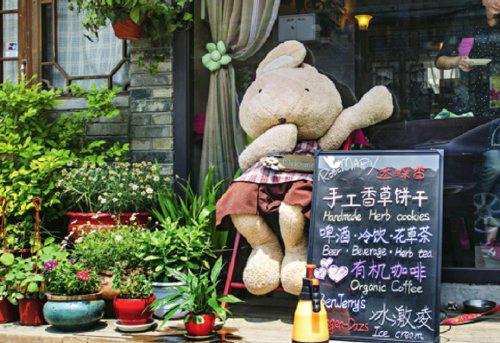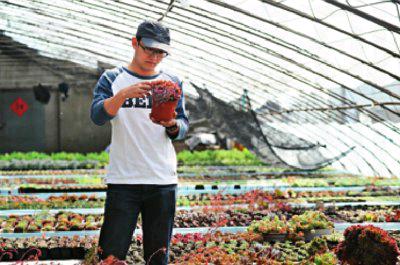Green Urban Business
By+staff+reporter+HU+YUE
JUST 10 km as the crow flies from Tiananmen Square on Beijings west fourth ring road is Meinuo Garden, Xue Lu and her husband Li Hes succulent plant greenhouse. Compared to other horticultural centers, Meinuo is close to the heart of the city. When it opens at weekends, hosts of horticulturalists pour in to search out and buy their favorite succulent plants.
Succulent plants, like the small spineless cactus, have adapted to arid conditions, and are distinctive for their fleshy water-storing leaves that act as water reservoirs. Under the influence over recent years of neighboring Japan and South Korea, succulent plants have become popular in China. Small, attractive and easy to maintain, they are the passion of urbanite plant lovers and feature largely in their home and workplace décor.
From Hobby to Business
In 2011, then 29-year-old Xue Lu happened to buy three pots of succulents for just five yuan at a flower market. Since then she has become a succulent fanatic. What differentiates her from other phytophilous fans is that she has made a business of her hobby, albeit by chance.
Xue Lus passion influenced her husband Li He. He began taking cuttings from young plants, and these clones gradually occupied the whole courtyard of their home. Early in 2013, the young couple decided to open an Internet plant shop named Meinuo Garden. They never imagined customer feedback would be so favorable. Although at first they earned only a few hundred yuan a month, Li He spotted the potential of their enterprise.
Last year, he decided to quit his lucrative job at an IT company. Giving up this position at the age of 33 to try his hand at an unfamiliar business was no easy choice for Li He. But with Xue Lus support, he took the plunge. In March 2014,they rented a vegetable greenhouse in Haidian District in northwestern Beijing to establish their company.
The online business grew, and within a year Meinuo had become the Beijing succulent plant store on taobao.com with the largest sales volume. The shop offers more than 400 different plant species, and more than 100 other species are available through direct sales at the greenhouse. The online shop attracts 6,000 to 8,000 visitors every day, and takes 200-300 orders. At present, sales total RMB 800,000 a month, and the pair estimates that this autumn –peak succulent plant season – sales are likely to increase to RMB one million per month. Compared to other similar Internet shops, however, at just 20 percent of gross profit, Meinuos profits are relatively low.endprint
Xue Lu expressed her worries about the Chinese succulents market: “Its a little disorderly as regards varieties and prices. This is mainly because consumers are unaware of it. Around 80 percent of Meinuo customers are young urban women, including a lot of high school students. They usually buy on impulse, so their consumption patterns arent stable. Those in Western countries are older and more experienced, and succulent cultivators in Japan and South Korea are mostly housewives who have time to take care of plants.” That the Chinese market is mainly composed of youth is not a disadvantage, however, because this signifies its great potential.
Meinuo Garden has now rented two other greenhouses nearby. The three are respectively used for seedlings, online selling, and direct sales at weekends. Xue Lu explained that the greenhouses are nevertheless insufficiently modern, so they have decided to rent a modern, fully automated greenhouse. “Being able to maintain a constant temperature in all seasons will increase production,” she said. Xue also plans to expand the operating range. “Well expand into herbaceous flowers and Heuchera which, in general, people who buy succulents also like.”
Office Plantation
A big problem for succulent growers in cities like Beijing is that office and home interiors often lack natural light. Yet in the sun-deficient office of the Lükongjian (Green Space) project team under the Vantone Group flourishes a jungle of flowers and plants.
On the day of our visit, Beijing was dark under an angry sand storm. But in Lükongjian, each office is ornamented with a shelf bearing pots of chamomile, mint, thyme and other herbs and vegetables that thrive under lights that emulate the sunshine. In a dark corner of the office are several non-illuminated shelves on which to grow mushrooms. The office is so full of plants that it resembles a garden or plant laboratory, to the extent that we forgot about the gloomy weather outside.
Zhang Xun, head of Lükongjian, and four other colleagues, are less commercially focused than Xue Lu and Li He. Although Lükongjian also has an online store that sells their products and growing kits that include shelves, lamps, soil and seedlings, the team is mainly occupied with activities four or five times a week that involve going to Beijing kindergartens. There they teach kids how to grow vegetables and herbs. The team also cooperates with Internet companies like toutiao.com on installing boxes in their offices. “The idea for this project comes from the plant factory in Japan, where light, temperature, water, and nutrients are all automatically controlled. We thought we would try it in cities of northern China where the climate is arid,” Zhang explained.endprint
How this non-commercial project was born in such a highly commercial real estate company as Vantone is what interested us. In 2010, Feng Lun, general manager of the group, launched a program called 3D City: a smart city project that encompasses industry and city, medical services, urban agriculture, and modern services. Two 3D City projects have since been launched in Xian and Wenzhou. Lükongjian is dedicated to the development of urban agriculture for this program. Young people from different professional fields have gathered here to do experiments and tests for the project.
Lükongjian ultimately chose to combine ecological agriculture and interior design to create green spaces in offices and habitats. “People can install multiple racks of flower boxes along the length and height of the room in a restaurant or an apartment. They can then pick mint for salads, or cut organic leeks to make dumplings. Its a healthy lifestyle,” said Zhang Xun, who has great confidence in the project.
Zhang Xuns team mainly promotes the “ecological life” concept to spur the demands of the urban population for this green mode of life and production. When there is a real market, it will launch a business plan.
Healing Cafe
Zhang Xuns team also focuses on creating a life pattern for potential consumers. The more people there are that understand the concept of living in an eco-friendly way, the better prospects the project will have. From this point of view, the Spoonful of Sugar Cafe in central Beijing shares the Lükongjian goal.
In October 2013, Beijing Design Week opened in a hutong near Qianmen, under the theme “City of Design, Smart City,” and many urban planning and vanguard designers gathered in this traditional Beijing neighborhood. After the Design Week, the area became a creative industry hub, and in early 2014, the Spoonful of Sugar opened there.
The café premises are in what used to be the Beijing Relay Factory. The plant sign still hangs on the cafés front door. As the building was in serious disrepair, Lin Lin, who owns the cafe, made thorough-going renovations from top to bottom to create a green space with a rustic ambience. Lin has planted vegetables, fruits and flowers on the roof sufficient to supply and decorate the shop.
Surrounded by flowers, the Spanish chef cooks delectable meals for diners using garden vegetables. Imported organic foods are also on sale on the ground floor of the coffee shop, and the bio-cosmetics it promotes are also very popular.
Customers are mainly whitecollars, according to Lin. They aspire to healthy food and a green living environment.
Life in big cities is exhausting to the extent that urban people often feel like unstoppable spinning tops, Lin believes. They consequently need a comfortable space to rest and soothe their spirit. This is why “green business” has become so popular in Chinas major cities. Succulent plants, indoor farmland, Spoonful of Sugar Cafe — all embody peoples pursuit of a healthier lifestyle, which is ultimately a human need.endprint

